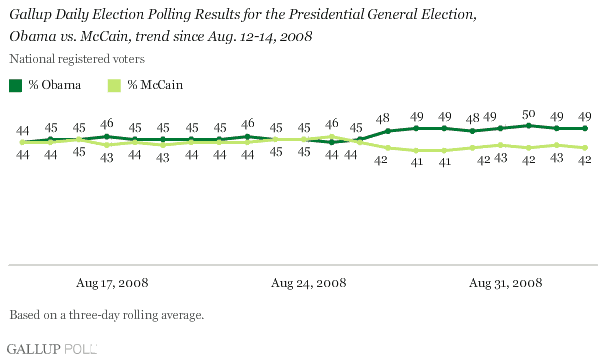"Can you trust the American public to see through this charade?"
Which begs a further explanation of my earlier point: I think the public always knows who is the original and who is the imitator. You can turn an opponents line back on them, if done right its a very successful way to blunt your opponents language,ie former Australian Prime Minister John Howard in 2004 changed questions of honesty, into "who do you trust on the economy/security/interest rates" etc.
But simply claiming a term as your own is transparent, makes you look a follower not a leader, and is almost always bound to fail, because these terms like 'new leadership' 'change we can begin in' 'country first' are not randomly thought up, but created with the specific candidate & their history in mind. It sticks only if it fits a genuine truth about the candidate that the public can identify with.
As such, when John Howard began saying we needed a 'different sort of education revolution' and then blathered about the need for teaching basic maths and English, no one would accept the term applied to his tired, old government.
Worse still for our would be copiers, every mention you make of it simply re-enforces your opponents issue, in this case that "change", is needed. So instead of competing across issues, you end up agreeing that your opponent is right, and now are trying to overcome the link between your opponent and this issue, whilst also trying to forge your own version of it. McCain and Palin's claims to:
vanquish the "constant partisan rancor" plaguing the nation as he [John McCain] launched his fall campaign for the White House. "Change is coming" to Washington, he promised the Republican National Convention.
simply makes Obama's point for him
(And is anyone really that dumb to forget that Bush is a Republican and that the Republicans have controlled congress for 6 of the last 8 years? Please..)
(I have much to say about establishing political ownership of some issues, and if you should fight on your opponents issues or try and change the topic to your own, but that's for another post)
But this is not just abstract theory, we can confidently say that the public will see through it because they already have once before. Over 5 long, news hyped months the Democratic primary saw Obama as the agent of change, vs Hillary Clinton as the woman of experience. Whose campaign then faltered and began using terms like change too:
NY Times Bill Clinton just finished the first of seven campaign events in Iowa today and tomorrow for Senator Hillary Rodham Clinton, and he’s using a phrase that voters are probably going to hear a lot this week: “Change agent.” As in, Mrs. Clinton is a change agent. Even during the years when she did not hold public office, but was rather a lawyer, first lady of Arkansas and then first lady of the United States, she was an agent for change, Mr. Clinton said several times to his audience at Iowa State University here.
Clinton tried to steal the change label of Obama several times, (as did Edwards) and it failed. And no one in their right mind thinks that a man of McCain's 21 years in the Senate, and aged 72 is more identifiable as a person of change, than the first serious female candidate for president & a well known liberal Clinton.
And finally, the public are seeing through it: Or at least Palin isn't thus far changing the pattern:


3 comments:
*more like the only commentator...* :P
But I wonder, was anonymous referring to the entire charade that that this election seems to have become?
But I guess most of the fun of the US elections is it’s heavy use of contemporary advertising methods.
I agree with your point that it’s nearly impossible to steal an opponents copy and call it your own, and it makes me wonder how long it will be before politicians start trademarking their slogans. I wonder what the public reaction would be. Any idea if they are barred from such practice?
this election should be read as referring to the US presidential election as it stands.
Looking at it again, that sentence makes me sound like a bit of a crazy man. My apologies.
Trademarking slogans - Now there's a novel idea. Problem is politicians generally lose votes for suing people, and slogans come from campaigns, who once done (won or lost) quickly disband.
Still, with google its getting increasingly hard to get away with using the lines of someone else. This is where the hacks of the last 20 years are in trouble, as focus groups and polling wont create the ideas, only smart, committed individuals can.
Which is how it used to be (Though even Lincon had pollsters and media people, so we are not necessarily weaker for having such people in the background)
Post a Comment